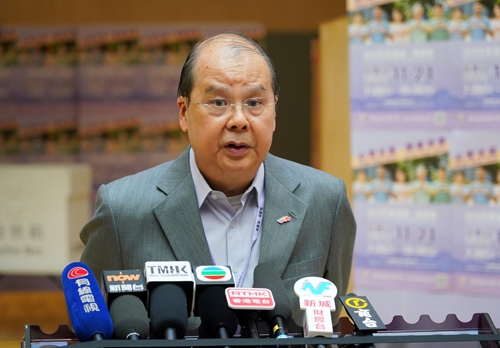No capital exodus from HK over new law: SAR official
By Dong Feng Source: Global Times Published: 2020/7/15 23:32:28

Matthew Cheung Kin-chung at a media briefing on November 24, 2019 Photo: cnsphoto
A senior official with the Hong Kong Special Administrative Region (HKSAR) government Wednesday debunked fear-mongering narratives pushed by some foreign officials and media outlets that the new national security law for the SAR could lead to a capital exodus from the city and even end its status as an international financial center, arguing that the law will boost the city's financial sector.
"There is no question of an exodus of funds from Hong Kong. On the contrary, the financial market remains buoyant," Matthew Cheung Kin-chung, chief secretary for administration of the HKSAR government, said in a written statement sent to the Global Times Wednesday.
Cheung stressed that the new national security legislation "would not affect overseas investors running businesses legally in Hong Kong, nor the city's international connectivity and extensive economic ties with foreign economies."
Following persistent social unrest in the city that started last summer, which, Cheung said, dented Hong Kong's status as a financial center, China's top legislative body, the National People's Congress, approved and enacted the national security law for Hong Kong on June 30, targeting four specific activities that endanger China's national security: secession, subversion of state power, terrorism and collusion with foreigners.
Since the enactment of the law, some Western countries, led by the US government, have mounted what Chinese officials call a smear campaign against the law in gross interference in China's internal affairs.
Some have even pronounced the "end" of Hong Kong as an international financial and commerce hub. The US has also moved to terminate its special trade treatment for Hong Kong.
In the written statement, Cheung said that the law would protect Hong Kong from "relevant threats," help the city maintain political and social stability, and "create a favorable environment in the long run for investment and conducting business."
Cheung pointed out that the Hong Kong stock market remained buoyant since the adoption of the law, the Hong Kong dollar's exchange rate remained stable, and international businesses remain confident in the city.
The Hang Seng Index has gained 4.32 percent since the market close on June 30 and Wednesday's close. The Hong Kong dollar exchange rate has also remained on the strong side of the convertibility zone of HK$7.75 per US dollar since June 30. In what Cheung described as "a vote of confidence," global index provider MSCI has even launched a suite of MSCI indexes in Asia and emerging markets in the Hong Kong Stock Exchange since the enactment of the law.
"[The law] will enable Hong Kong to restore its stability as soon as possible and get Hong Kong firmly back on track," Cheung said.